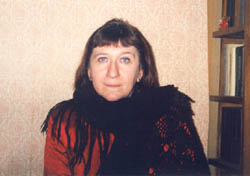| |
Закат столетия свинцов...
Мы не вполне живем на свете -
Мы доживаем жизнь отцов,
Тяжелые, большие дети.
О, мы не можем ждать и дня -
Нам истину подай сейчас же! -
И в каждом гиблая родня
Гудит, свое не откричавши.
...Пока мы ссоримся впотьмах
И семечки пустые лущим, -
Ты
разметалась на ветрах,
Между прошедшим и грядущим,
Родная родина моя, -
Гостеприимные по-русски,
Не только рощи и поля,
Но и свирепые кутузки,
Но и могилы для живых,
И для здоровых лазареты...
Сошла б с ума, -
но кто за н и х
Рассмотрит новые приметы?
|
This is the sunset of the century
of the bullet.
We are only half living in the
light of the world.
We, big, heavy children,
live out the life of our fathers.
Oh, we can not wait for a single
day more;
give us the truth right now!
Within each of us our relatives who
perished
murmur their stories that were
never shouted out.
… While we argue in the dark
and crack hollow nuts
you our home country
were laid out on the hills
between the past and the future.
Not only woods and fields
are hospitable in Russian
but also the harsh prisons,
and graves for the living,
and sick-bays for the healthy…
I would have gone mad. But who will
spot
the new warning signs for them?
Translated by Richard McKane
|
